- Home
- entertainment
- news
- Every detail and Easter egg you may have missed on Taylor Swift's new album 'Evermore'
Every detail and Easter egg you may have missed on Taylor Swift's new album 'Evermore'
Callie Ahlgrim

- Taylor Swift released her ninth studio album "Evermore" on Friday.
- Billed as a companion to July's "Folklore," it's similarly rich with poetic lyrics, callbacks to old songs, and fictional narratives.
- "I loved the escapism I found in these imaginary/not imaginary tales," Swift wrote in her release announcement. "So I just kept writing them."
- "Before I knew it there were 17 tales, some of which are mirrored or intersecting with one another," she added.
- For example, "'Tis the Damn Season" and "Dorothea" tell the story of two high school sweethearts, who briefly reunited for a holiday weekend.
- Below you'll find a track-by-track breakdown of "Evermore," including the details and Easter eggs you may have missed.
Taylor Swift's newest album "Evermore," her second surprise release of the year, is another shining example of the singer's songwriting prowess.
Billed as a companion to July's "Folklore," it's similarly rich with poetic lyrics, callbacks to old songs, and fictional narratives.
"I loved the escapism I found in these imaginary/not imaginary tales," Swift wrote in her release announcement. "So I just kept writing them."
"Before I knew it there were 17 tales, some of which are mirrored or intersecting with one another," she added later, referring to the 15-song tracklist, plus the album's two unheard bonus tracks.
Any Swift fan knows that she loves to hide winks, hidden details, and thematic parallels in her songs and videos. Swift honed this tradition with "Folklore" and doubled down with "Evermore," adopting different perspectives and creating storylines that augment and enrich the listening experience.
Many moments on "Evermore" also refer back to Swift's previous albums, especially "Folklore," as well as real-life facts about her life.
Insider created a guide to all the patterns, plots, and Easter eggs you may have missed.
Keep reading to see our track-by-track breakdown.
"Willow" has lyrical similarities to "August" and thematic similarities to "Love Story."
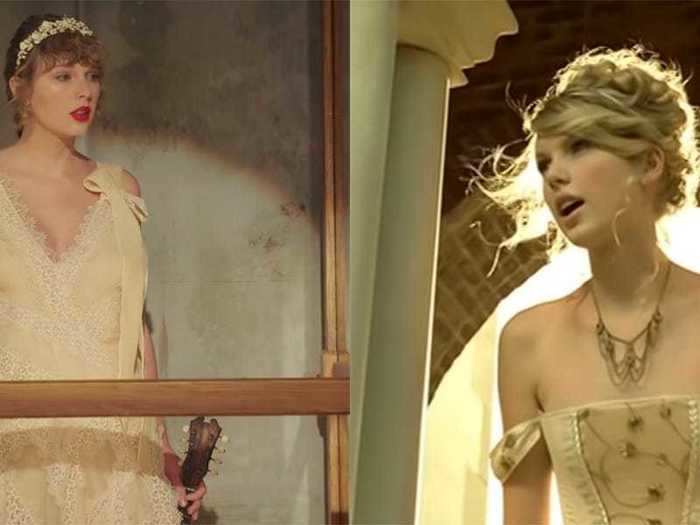
Throughout "Willow," Swift uses a variety of metaphors to explain a certain man's transformative effect in her life.
"I'm like the water when your ship rolled in that night / Rough on the surface, but you cut through like a knife," she begins.
This could be a nod to "Cruel Summer," the second track on "Lover," which fans believe is about the beginning stages of her relationship with Joe Alwyn ("So cut the headlights, summer's a knife / I'm always waiting for you just to cut to the bone").
"Lost in your current like a priceless wine" also seems to reference "August," the eighth track on "Folklore" ("August sipped away like a bottle of wine").
Similarly, the chorus of "Willow" recalls the bridge of "August."
In the former, Swift sings, "I'm begging for you to take my hand / Wreck my plans, that's my man."
This request, signaling Swift's willingness to change course for her lover, echoes the longing that she described in the latter: "For me, it was enough / To live for the hope of it all / Cancel plans just in case you'd call."
Thematically, "Willow" resembles Swift's 2008 hit "Love Story," especially the third verse ("Wait for the signal, and I'll meet you after dark").
Throughout "Love Story," her character arranges clandestine meetings with her lover: "So I sneak out to the garden to see you / We keep quiet, 'cause we're dead if they knew," she sings, and later, "My faith in you was fading / When I met you on the outskirts of town."
Swift herself said the song is about "intrigue, desire and the complexity that goes into wanting someone."
She told fans, "I think it sounds like casting a spell to make someone fall in love with you," which strengthens its thematic connection to "Love Story." Both songs illustrate courtship using mythical terms and fairytale visuals.
However, that same line in "Willow" also echoes the second verse of "Delicate:" "Dive bar on the East Side, where you at? / Phone lights up my nightstand in the black / Come here, you can meet me in the back."
"Champagne Problems," which Swift cowrote with her boyfriend, is overflowing with lyrical Easter eggs.
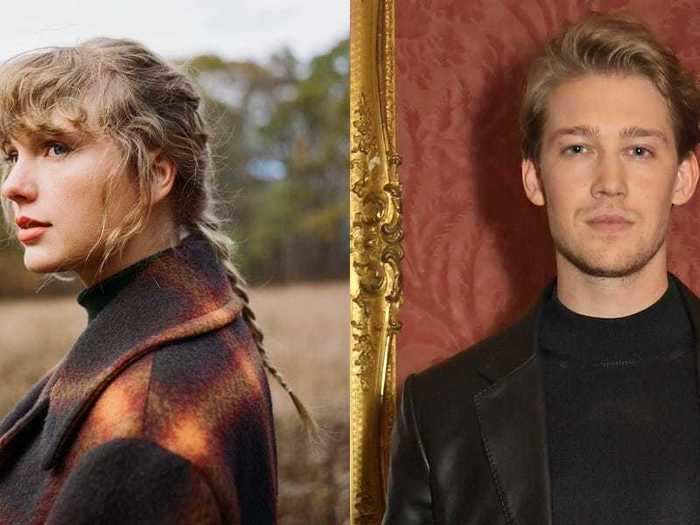
Swift described "Champagne Problems" as the story of "longtime college sweethearts [who] had very different plans for the same night, one to end it and one who brought a ring."
The narrator turns down a proposal because she "never was ready," and forecasts a more fulfilling future relationship for her ex.
The lyrics contain several nods to old songs — especially those seemingly inspired by Alwyn, Swift's longtime boyfriend and recent collaborator, who cowrote three tracks on "Evermore" under the pseudonym William Bowery.
"I dropped your hand while dancing" may be a nod to "Dancing With Our Hands Tied," the 11th track on "Reputation." (Swift previously told fans that the positive songs on "Reputation" were largely inspired by Alwyn.)
"My picture in your wallet" recalls the very same song, which contains the similar line, "Picture of your face in an invisible locket."
"Champagne Problems" — especially its references to bottles, Dom Perignon, and toasts — also reminds fans of "New Year's Day," the sweet closing track on "Reputation," inspired by the holiday most closely associated with champagne.
In the second chorus of "Champagne Problems," the narrator admits she "couldn't give a reason" for breaking her lover's heart, which echoes two sad "Folklore" songs: "The 1" ("In my defense, I have none") and "Hoax" ("Stood on the cliffside / Screaming 'give me a reason'").
But the bridge, especially, is littered with lyrical Easter eggs.
"Your Midas touch on the Chevy door" refers to the legend of King Midas, who turned everything he touched to gold, though it came at a heavy cost.
Swift often uses the color gold to reference Alwyn, as in "Dress" ("Made your mark on me, a golden tattoo"), "Daylight" ("I once believed love would be burning red, but it's golden"), and "Invisible String" ("One single thread of gold tied me to you").
The lyric also subtly foreshadows the next track on "Evermore," which is called "Gold Rush."
Another lyric, "Soon they'll have the nerve to deck the halls / That we once walked through," foreshadows track four, "'Tis the Damn Season" — another song about two classmates who date throughout a certain era of their lives, only to break up after they graduate.
"November flush and your flannel cure" recalls Swift's beloved power ballad "All Too Well," which her fans heavily associate with autumn.
The best lyric in "Champagne Problems" — "'She would've made such a lovely bride / What a shame she's f---ed in the head,' they said" — recalls the themes of "The Last Great American Dynasty" and "Mad Woman," two "Folklore" songs that examine how labels like "crazy" and "shameless" are forced upon women who seem free or illogical.
"Gold Rush" seems to reference love songs like "Gorgeous," "Cornelia Street," and "Lover."
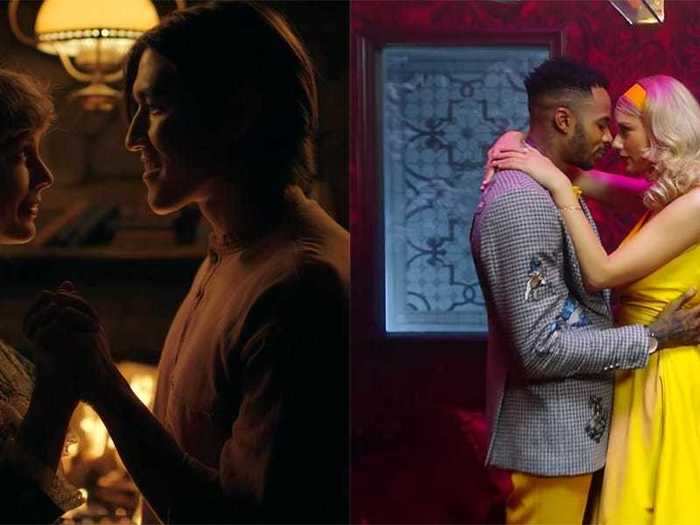
Swift, who cowrote "Gold Rush" with Jack Antonoff, said the song "takes place inside a single daydream where you get lost in thought for a minute and then snap out of it."
As previously mentioned, the evocation of gold historically means this song is about Alwyn.
In the intro, Swift sings, "Eyes like sinking ships on waters / So inviting, I almost jump in."
This may be a callback to the image of a ship in "Willow," but it's also a reference to "Gorgeous," a "Reputation" single that Swift has confirmed was inspired by her boyfriend ("Ocean blue eyes looking in mine / I feel like I might sink and drown and die").
In both verses, Swift sings wistfully, "What must it be like to grow up that beautiful?" — again recalling the core concept of "Gorgeous."
"I see me padding across your wooden floors" is visually similar to the second verse ("memorize the creaks in the floor") and bridge ("barefoot in the kitchen") of "Cornelia Street," a song from "Lover."
Another line in the chorus, "Everybody wants you / Everybody wonders what it would be like to love you," is almost certainly a reference to "Lover," the titular track of Swift's seventh album ("I'm highly suspicious that everyone who sees you wants you").
The second verse of "Gold Rush" contains the most obvious lyrical reference in the song: "My mind turns your life into folklore."
"'Tis the Damn Season" is told from the perspective of a character named Dorothea.
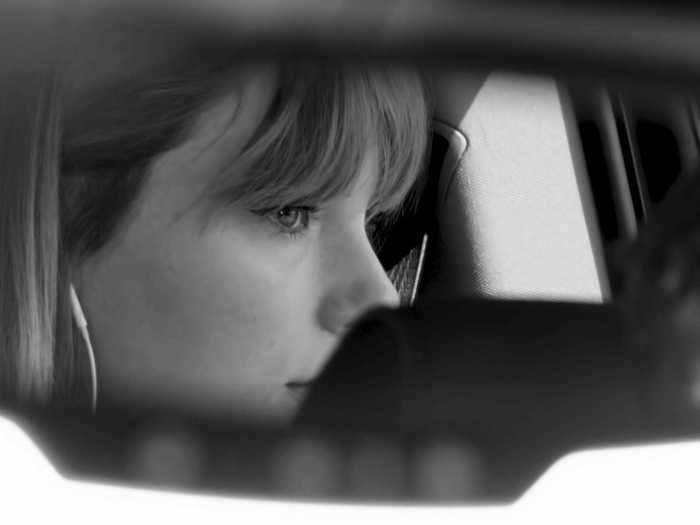
Swift described Dorothea as "the girl who left her small town to chase down Hollywood dreams." She also revealed that one of the songs on "Evermore" is about "what happens when [Dorothea] comes back for the holidays and rediscovers an old flame."
This almost certainly means that "'Tis the Damn Season" is told from Dorothea's perspective.
The song's narrator says she's "stayin' at [her] parents' house" for the holiday season and she'll eventually return to her home in Los Angeles — even though it'll break her heart to leave her high school sweetheart again.
"You can call me babe for the weekend," she sings in the chorus, recalling memorable lines in "Blank Space" ("I can make the bad guys good for a weekend") and "Cardigan" ("Playing hide-and-seek and / Giving me your weekends").
"The holidays linger like bad perfume" calls back to "Illicit Affairs," the 10th track on "Folklore," again making an artificial scent seem sinister ("Leave the perfume on the shelf / That you picked out just for him / So you leave no trace behind / Like you don't even exist").
Dorothea also makes multiple references to driving and cars: "I parkеd my car right between the Methodist / And thе school that used to be ours," "It's the kind of cold, fogs up windshield glass." These recall "Style," a "1989" single that also illustrates a reunion with an old flame — and a song that's known for its descriptions of bad driving.
"The road not taken looks real good now" is a clear reference to Robert Frost's "The Road Not Taken."
The poem famously concludes: "Two roads diverged in a wood, and I— / I took the one less traveled by, / And that has made all the difference."
Swift draws a contrast between Dorothea's regret and Frost's triumph. While Dorothea took a fairly common path by moving to LA to pursue stardom, it hasn't brought her happiness.
"So I'll go back to LA and the so-called friends / Who'll write books about me, if I ever make it," she sings bitterly, recalling Swift's takedown of celebrity trappings and fake friendship in "This Is Why We Can't Have Nice Things" and her desire to escape and lead a private life in "The Lucky One."
"Tolerate It" bears unmistakable shades of "Dear John."
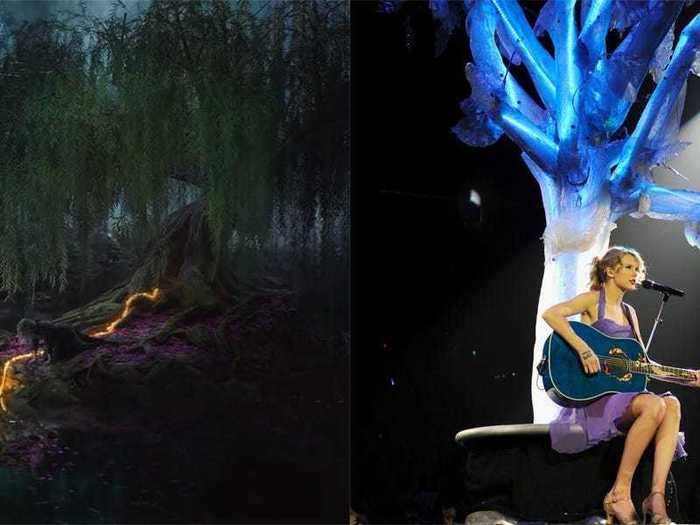
Swift said that "Evermore" contains an "'unhappily ever after' anthology of marriages gone bad that includes infidelity, ambivalent toleration, and even murder."
"Ambivalent toleration" refers to "Tolerate It," which tells the story of a neglected wife.
Some fans believe that Swift based this story on Netflix's "The Crown" — more specifically, on season four's depiction of Prince Charles and Princess Diana's marriage.
It's not an unreasonable theory, as Swift has been inspired by film and TV in the past. She wrote "Death by a Thousand Cuts," the 10th track on "Lover," after watching the Netflix film "Someone Great."
She also told Entertainment Weekly that she was inspired to write songs in quarantine after watching lots of movies, and that "My Tears Ricochet" was partially inspired by "Marriage Story," another Netflix original.
However, Swift told Apple Music's Zane Lowe that "Tolerate It" was largely inspired by "Rebecca," a 1938 Gothic novel by Daphne du Maurier.
"I was thinking, 'Wow, her husband just tolerates her. She's doing all these things and she's trying so hard and she's trying to impress him, and he's just tolerating her the whole time,'" she explained. "There was a part of me that was relating to that, because at some point in my life, I felt that way."
Indeed, the lyrics contain references to multiple breakup songs in Swift's catalog, especially from her 2010 album "Speak Now."
"Tolerate It" begins: "I sit and watch you reading with your head low / I wake and watch you breathing with your eyes closed."
This quiet attentiveness recalls the bridge of "Last Kiss," which describes similar actions in the past tense: "So I'll watch your life in pictures like I used to watch you sleep / And I feel you forget me like I used to feel you breathe."
When Swift sings, "You're so much older and wiser, and I / I wait by the door like I'm just a kid," she draws a clear parallel with "Dear John," another song that received Swift's distinguished track five placement.
As Insider's music editor Courteney Larocca noted in our review, "Tolerate It" feels like "what happened to the girl from 'Dear John' if she didn't take John's matches before fire could catch her."
In both songs, Swift describes how draining it is to love someone who's cruelly apathetic — especially someone who's older and seemingly wiser ("Don't you think I was too young to be messed with? / The girl in the dress cried the whole way home").
The next line, "Use my best colors for your portrait," recalls the bridge of "Illicit Affairs" ("Look at this godforsaken mess that you made me / You showed me colors you know I can't see with anyone else").
There are some parallels with more hopeful songs.
"If it's all in my head, tell me now" mirrors the climactic twist in "Love Story" ("'Is this in my head? I don't know what to think' / He knelt to the ground and pulled out a ring").
"Where's that man who'd throw blankets over my barbed wire?" warps a positive image in "Invisible String" ("Something wrapped all of my past mistakes in barbed wire"). This probably represents how the relationship used to be comforting, but became painful.
"No Body, No Crime" is a "murder mystery song" featuring vocals from Este and Danielle Haim.

"No Body, No Crime" is the "even murder" part of "Evermore's" aforementioned marriage anthology. It illustrates, in Swift's words, "the most righteous motive, to avenge the fallen."
The "fallen" refers to a character named Este, who's murdered by her husband — before Swift's character murders him in return.
Este is named after Este Haim, one of three sisters in HAIM. The aptly named rock band opened for Swift on her "1989" tour, and the women have remained close through the years. Swift enlisted two of the three, Este and Danielle, to provide vocals after she wrote "No Body, No Crime" on her own.
Swift said she named the character Este "because she's the friend I have who would be stoked to be in a song like that."
"I had finished the song and was nailing down some lyric details and texted her, 'You're not going to understand this text for a few days but... which chain restaurant do you like best?' and I named a few," she told Entertainment Weekly.
"She chose Olive Garden and a few days later I sent her the song and asked if they would sing on it. It was an immediate 'YES.'"
In the second verse, Swift sings, "Este wasn't there Tuesday night at Olive Gardеn / At her job or anywhere."
Verse two also contains an apparent nod to Carrie Underwood's "Before He Cheats," another iconic country song about revenge: "And I noticed when I passed his house / His truck has got some brand new tires."
In essence, Underwood plays the role of Este: "Slashed a hole in all four tires / Maybe next time, he'll think before he cheats." Swift could be hinting that her fictional friend confronted her husband about cheating, before he killed her.
"Happiness" alludes to symbols of longing and regret in "The Great Gatsby."
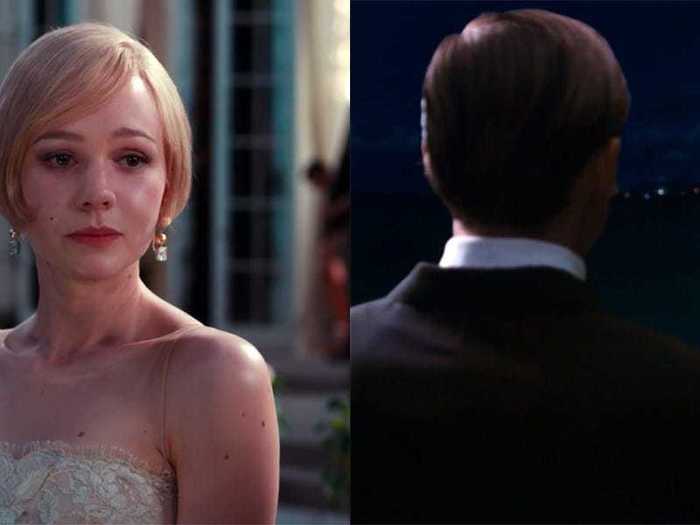
"Happiness" was the last song added to "Evermore," written just one week before its release. Swift said it's about "the realization that maybe the only path to healing is to wish happiness on the one who took it away from you."
Right away, there's a callback to "Seven," which shares the same track-seven slot on "Folklore."
"Honey, when I'm above the trees / I see this for what it is," she sings. The first line of "Seven" is similarly woodsy: "Please picture me in the trees."
"Showed you all of my hiding spots" may be a reference to "I Know Places," the 12th track on "1989" ("I know places we can hide").
The first verse ends with a reckoning: "I haven't met the new me yet."
This echoes similar sentiments on "All Too Well" ("I'd like to be my old self again / But I'm still trying to find it") and "Look What You Made Me Do" ("The old Taylor can't come to the phone right now"). All three songs deal with rediscovering or remaking your sense of self after experiencing a personal rupture.
Swift explained the lyric during her interview with Lowe: "The person I'm going to have to become in order to get over this."
In the second verse, the lyric shifts to, "You haven't met the new me yet," which Swift explained: "You haven't met the person who's going to replace me yet, but I know you're going to."
"There's another meaning to the phrase," Swift added, "which is that, I have no idea what comes after this and I truly have no plan. And I'm OK with that."
Most interestingly, "Happiness" seems to draw heavily from "The Great Gatsby," F. Scott Fitzgerald's 1925 novel.
Swift previously included an explicit nod to Gatsby in "This Is Why We Can't Have Nice Things," and alluded to the story again with "Folklore" opening track, "The 1."
In "Happiness," however, Swift doesn't nod to the character's famous parties, or the Roaring '20s when the story takes place. Rather, she references specific quotes and images from the novel that are ripe with longing and regret.
"Tell me, when did your winning smile / Begin to look like a smirk?" she sings in verse two.
Alone, this would not seem like a literary reference. But in context, this is reminiscent of how Nick, the book's narrator, describes his early impression of Gatsby.
"He had one of those rare smiles with a quality of eternal reassurance in it, that you may come across four or five times in life," Nick explains. "It faced, or seemed to face, the whole external world for an instant and then concentrated on you with an irresistible prejudice in your favor."
This smile is the essence of Gatsby's charm. But his "irresistible prejudice in your favor" could be interpreted as manipulative, or at least performative.
Also in verse two, Swift sings pointedly, "I hope she'll be a beautiful fool / Who takes my spot next to you."
The term "beautiful fool" is taken from Daisy Buchanan, Gatsby's muse, who's in a loveless marriage with an unfaithful man.
"I hope she'll be a fool," Daisy says of their young daughter. "That's the best thing a girl can be in this world, a beautiful little fool."
Paired with Swift's fascination with divorce on this album, her use of this term is very telling. It points to a distinctly feminine anger, a sense of helplessness — and ties "Happiness" to her songs about infidelity, like "No Body, No Crime" and "Illicit Affairs."
Finally, Swift makes Gatsby's influence clear by using the book's most famous symbol.
"After giving you the best I had / Tell me what to give after that / All you want from me now is the green light of forgiveness," she sings in the third verse.
In "The Great Gatsby," the green light at the end of Daisy's dock represents Gatsby's undying love (or obsession, depending on how you look at it). Nick refers to the light as an "enchanted object," because its only significance is what Gatsby pours into it.
Perhaps Swift is suggesting that the concept of "forgiveness" isn't as powerful as it seems, especially if you believe that it could magically absolve many years of pain.
The narrator in "Dorothea" is the old flame from "'Tis the Damn Season."
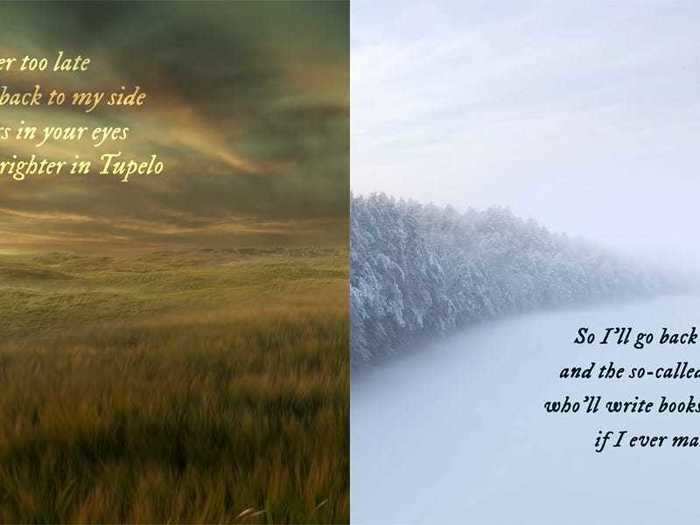
"Dorothea" was the first song written for "Evermore."
"There's not a direct continuation of the betty/james/august storyline, but in my mind Dorothea went to the same school as Betty James and Inez," Swift told fans in a YouTube comment.
Indeed, "Dorothea" is addressed to its titular character — just like "Betty," the 14th track on "Folklore."
The narrator reminisces about the same relationship from "'Tis the Damn Season," but from the perspective of Dorothea's unnamed high school sweetheart.
The song includes several callbacks to "'Tis the Damn Season," fleshing out Dorothea's departure from her hometown in Tupelo.
"You got shiny friends since you left town / A tiny screen's the only place I see you now," Swift sings, recalling the "so-called" friends that Dorothea previously mentioned.
Appropriately, the lyrics also nod to some of Swift's older love songs from her teenage days.
"The stars in your eyes shined brighter in Tupelo" recalls a similar image in "Tim McGraw," even down to the specific location callout (He said the way my blue eyes shined / Put those Georgia stars to shame that night").
"But are you still the same soul I met under the bleachers?" resembles a classic high-school scene in "You Belong With Me" ("She's cheer captain and I'm on the bleachers").
"Coney Island" recalls themes and visuals from "Mirrorball," "Delicate," and "August," among others.

Swift cowrote "Coney Island" with producers Aaron Dessner and Bryce Dessner, as well as Alwyn — who, interestingly, did a photoshoot in Coney Island for a 2018 Esquire interview.
As Larocca noted in Insider's "Evermore" review, the first verse ("If I can't relate to you anymore / Then who am I related to?") strongly recalls the existentialism of "Mirrorball."
"It begs the question: Who is Swift when her songs stop being about her and her reliability? What happens if she gets off the tightrope, and stops shining just for you?" Larocca wrote.
Later in the first verse, Swift sings, "Did I close my fist around something delicate? / Did I shatter you?"
This echoes another image from "Mirrorball" ("And when I break, it's in a million pieces"), but ties in a reference to "Delicate," a beloved "Reputation" single that grapples with the fragility of a new relationship.
Most obviously, the second pre-chorus of "Coney Island" is an extended reference to "Meet me behind the mall," a crucial symbol of nostalgia in "August."
"'Cause we were like the mall before the internet / It was the one place to be / The mischief, the gift-wrapped suburban dreams," Swift sings.
"I was trying to reflect on the Coney Island visual, of a place where thrills were once sought," Swift told Lowe. "A place where once, it was all electricity and magic, and now the lights are out, and you're looking at it thinking, 'What did I do?'"
In the bridge, Matt Berninger sings, "Did I paint your bluest skies the darkest grey?"
This line, especially delivered by a male voice, is strikingly similar to a sentiment in "Dear John" ("You paint me a blue sky / Then go back and turn it to rain").
Berninger also sings, "And when I got into the accident / The sight that flashed before me was your face."
This could be inspired by the same accident that Swift describes in "Out of the Woods," the second single from "1989" ("Remember when you hit the brakes too soon? / Twenty stitches in a hospital room").
Some fans believe that "Coney Island" is littered with subtle references to Swift's ex-boyfriends, reflecting on the general feeling of loss.
"Ivy" is ostensibly a story about infidelity, but the "jealous husband" could be a metaphor.
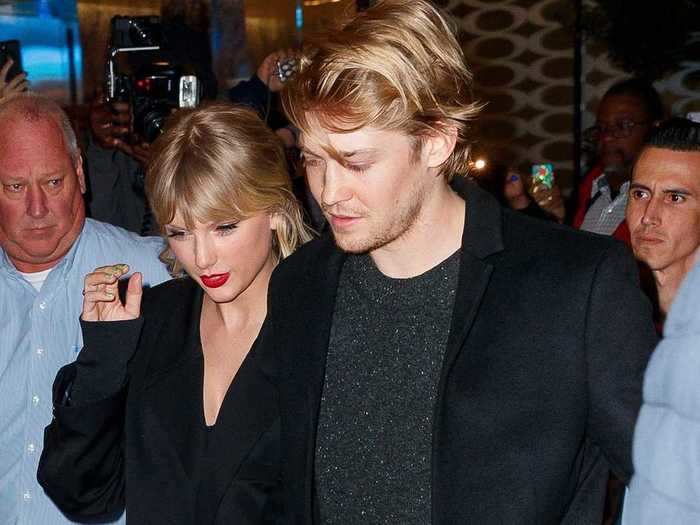
On its face, "Ivy" is the "infidelity" part of "Evermore's" failed marriage anthology.
The narrator seems to be a married woman who's falling in love with someone else, terrified that her husband will find out.
However, the song could also be interpreted as a metaphor for Swift and Alwyn, trying to shield their relationship from the public's prying eyes.
Several details point to Alwyn's influence. "Your touch brought forth an incandescent glow / Tarnished but so grand" could be a reference to "Afterglow," the 15th track on "Lover."
The term "afterglow" refers to the validation and comfort of their commitment, even in the wake of a fight or self-sabotage — which may "tarnish" the glow, but not necessarily weaken it.
Swift's "Ivy" character also tells her lover, "I wish to know / The fatal flaw that makes you long to be / Magnificently cursed."
This brings to mind the theme of "Peace," the 15th track on "Folklore," which Swift has described as "more rooted in my personal life." In the song, Swift worries that her chaotic fame will ruin her relationship.
In "Ivy," Swift sings, "He's in the room / Your opal eyes are all I wish to see / He wants what's only yours."
Swift has alluded to Alwyn's blue eyes in many songs, including "Delicate" ("Oh damn, never seen that color blue") and "Gorgeous" ("Ocean blue eyes looking in mine"). She also told Us Magazine in 2017 that opals, which tend to have a blueish hue, have always been her favorite kind of stone.
In this metaphor, the "jealous husband" character would be the media. Swift knows that people crave information about her love life, but she and Alwyn choose to keep details about their relationship private.
"What would he do if he found us out? / Crescent moon, coast is clear / Spring breaks loose, but so does fear / He's gonna burn this house to the ground," Swift sings.
Again, "he" could represent the public eye, especially when Swift and Alwyn began dating in secret.
Before now, the singer's relationships have suffered and failed when exposed to the spotlight, as she describes in "I Know Places" ("See the vultures circling, dark clouds / Love's a fragile little flame, it could burn out").
Swift's bandit character in "Cowboy Like Me" seems partially inspired by "Getaway Car" and "Don't Blame Me."
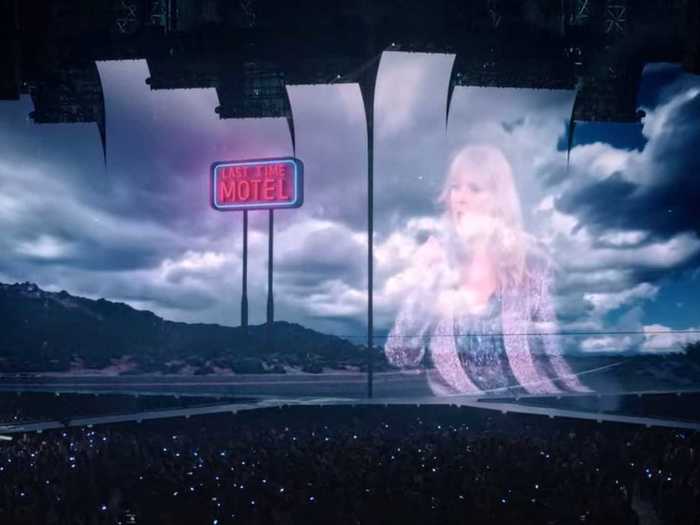
According to Swift, "Cowboy Like Me" is about "two young con artists who fall in love while hanging out at fancy resorts trying to score rich romantic beneficiaries."
In the first verse, Swift sings, "And you asked me to dance / But I said, 'Dancing is a dangerous game.'"
Not only does this nod to "Dancing With Our Hands Tied," but Swift mentions dancing elsewhere in this tracklist: "Champagne Problems" ("I dropped your hand while dancing") and "Happiness" ("I was dancing when the music stopped").
Appropriately, both of these mentions signaled impending breakups, a kind of emotional danger. It's as though Swift's "Cowboy Like Me" character has received warnings from those songs' characters.
There are also several nods to "Getaway Car," the fan-favorite ninth track on "Reputation."
Swift's "Cowboy Like Me" character tells her new partner, "You're a bandit like me." In "Getaway Car," she compares herself and her partner to the infamous criminal couple Bonnie and Clyde.
"Cowboy Like Me" also flips the climax of "Getaway Car" on its head.
"Never wanted love / Just a fancy car / Now I'm waiting by the phone / Like I'm sitting in an airport bar," she sings in the former.
"I left you in a motel bar / Put the money in a bag and I stole the keys / That was the last time you ever saw me," she sings in the latter.
In the bridge, there's a nod to another naughty "Reputation" track, "Don't Blame Me."
"And the old men that I've swindled / Really did believe I was the one," Swift sings, echoing the first verse of "Don't Blame Me" ("I've been breaking hearts a long time / And toying with them older guys").
"Long Story Short" is probably one of the album's most autobiographical songs.
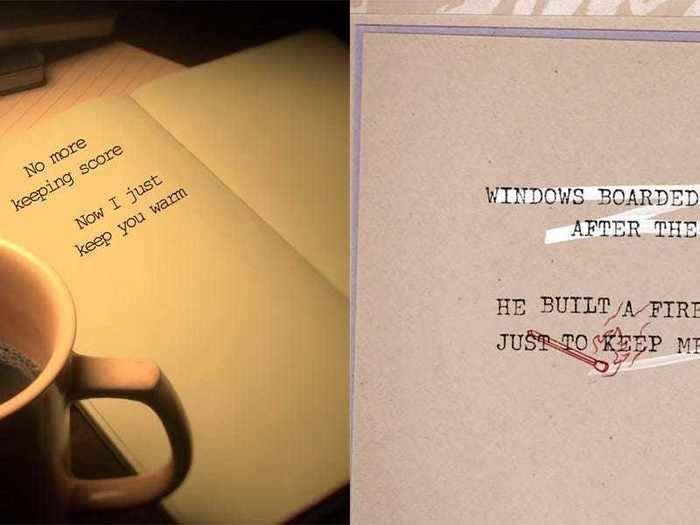
"Long Story Short" seems clearly inspired by Swift's "cancellation" in 2016, when she was labeled a "snake" and retreated from the public eye in response.
As Larocca wrote, "it's a 'Lover' era message wrapped in '1989' production about overcoming her 'Reputation' mistakes."
The song is suitably sprinkled with callbacks. "I tried to pick my battles 'til the battle picked me" recalls the 2017 single "End Game" ("I swear I don't love the drama, it loves me"), while "the knife cuts both ways" recalls "Call It What You Want" ("I brought a knife to a gunfight").
In fact, there are multiple parallels with "Call It What You Want." In the chorus of "Long Story Short," Swift sings that she "fell from the pedestal."
This recalls similar "fallen from grace" imagery in "Call It What You Want" ("My castle crumbled overnight," "They took the crown").
Swift uses warmth as a metaphor for love in both songs, which she also does in "Peace" ("I'm a fire and I'll keep your brittle heart warm").
She makes a more explicit reference to "Peace" in verse two: "And we live in peace / But if someone comes at us, this time, I'm ready."
"Right down the rabbit hole" is likely a nod to "Wonderland," the 14th track on the deluxe edition of "1989" ("Flashing lights, and we / Took a wrong turn, and we / Fell down a rabbit hole").
"If the shoe fits, walk in it 'til your high heels break" is an interesting allusion to "Mirrorball," in which Swift uses high heels as a symbol for confidence, validation, and performance ("Spinning in my highest heels, love / Shining just for you").
This ties back into the "fallen from grace" imagery. When Swift's reputation was damaged, her metaphorical high heels — her ability to please and perform for people — broke.
Given the song's presumable timeline, "Long Story Short" may also contain a sneaky dig at Tom Hiddleston, whom Swift dated shortly after she was "canceled" ("Pushed from the precipice / Clung to the nearest lips / Long story short, it was the wrong guy"). The relationship didn't last long, and her feelings for Alwyn may have overlapped.
There's also a nod to "Daylight," the 18th and final track on "Lover."
"When I dropped my sword / I threw it in the bushes and knocked on your door," she sings in "Long Story Short."
"Threw out our cloaks and our daggers / Because it's morning now," she sings in "Daylight."
"Marjorie" is the sister song to "Epiphany," the 13th track on "Folklore."
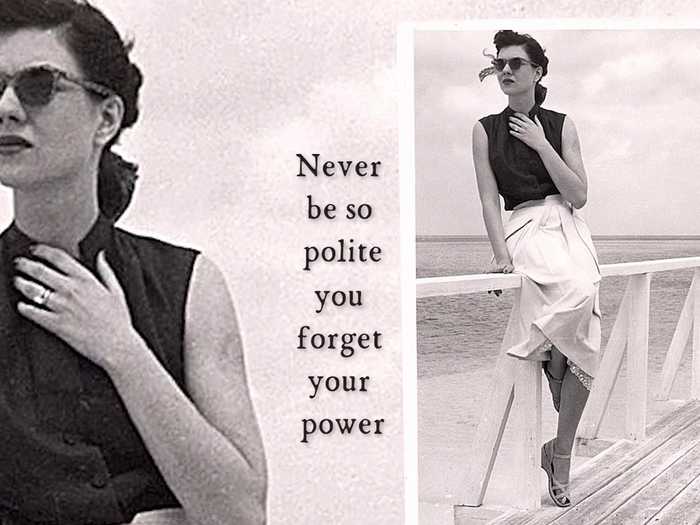
"Marjorie" is a moving tribute to Swift's grandmother, Marjorie Finlay, an opera singer who died in 2003. Swift said she "still visits me sometimes...if only in my dreams."
As Rolling Stone's Rob Sheffield noted, this song is a companion to "Epiphany," the 13th track on "Folklore" that was partially inspired by Swift's grandfather, Dean. Indeed, "Marjorie" is the 13th track on "Evermore" — a number that, as any Swiftie knows, plays a sentimental role in Swift's life. Finlay also died when Swift was 13 years old.
"Dean was her father's father, Finlay her mother's mother," Sheffield wrote. "But they both inspire their granddaughter to visit some scary places creatively. They're both songs about living with the dead as you grow older, and feeling their spirit in your bones."
Sheffield also noted a clever line in the bridge ("Should have kept every grocery store receipt") that recalls Swift's "Reputation" era, yet amps up the stakes.
In the bridge of "I Did Something Bad," Swift sings, "They're burning all the witches even if you aren't one / They got their pitchforks and proof, their receipts and reasons." Now, the image of a "receipt" is transformed from something petty to something profound.
Other lyrics in the bridge recall the commitment bop "Paper Rings," the eighth track on "Lover."
"Long limbs and frozen swims / You'd always go past where our feet could touch," Swift sings about her grandmother.
"In the winter, in the icy outdoor pool / When you jumped in first, I went in too," Swift sings in "Paper Rings." Both sets of lyrics, especially when paired, describe the depth of Swift's connections — and her willingness to take risks for the people she loves.
You could also argue that "Marjorie" contains the thesis for "Evermore," much like "Seven" did for "Folklore."
The song's central lyric, "What died didn't stay dead / You're alive, you're alive in my head," is thematically similar to "Passed down like folk songs / The love lasts so long." Both albums proclaim the importance and immortality of Swift's own stories.
"Closure" sounds like a breakup song, but might actually address either Scott Borchetta or Scooter Braun.
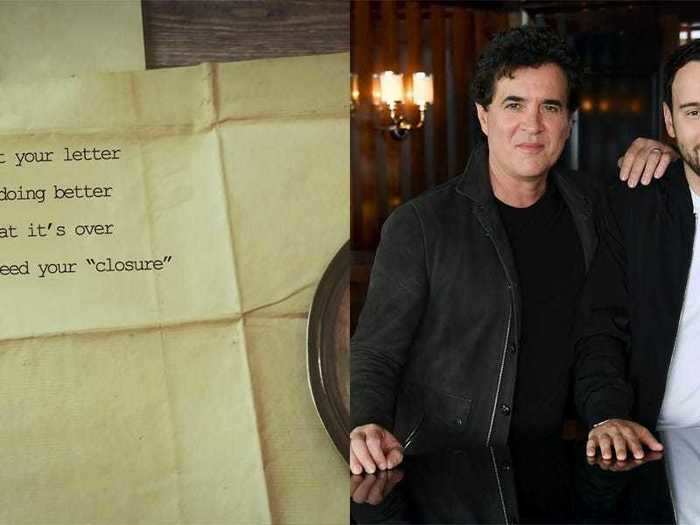
It's easy to assume that "Closure" is about an ex, but various details may point to a more professional "spite."
"It's been a long time / And seeing the shape of your name / Still spells out pain," Swift sings in the first verse.
This phrasing is interesting. "The shape of your name" evokes a signature (which, by definition, must have a very unique shape), and a signature evokes a legal document or contract.
Since leaving Big Machine Records and signing with Republic Records in 2018, Swift has clashed publicly with Big Machine CEO Scott Borchetta and celebrity manager Scooter Braun, who purchased the Nashville-based indie label shortly after she left.
Swift was particularly displeased that Braun acquired ownership of the master rights to her first six albums. Most recently, he sold them to a private-equity company called Shamrock Holdings.
When news of Braun's sale broke in November, Swift said she already knew because Shamrock sent her a letter. In the chorus of "Closure," Swift sings, "Yes, I got your letter / Yes, I'm doing better."
The latter half of that lyric could refer to the process of rerecording her old songs, which Swift said has been "both exciting and creatively fulfilling." It could also just be a flex about releasing one of 2020's best and most beloved albums.
"Don't treat me like / Some situation that needs to be handled," she sings in the second verse.
This could refer to the non-disclosure agreement that Braun allegedly wanted her to sign.
Swift said she wanted to regain ownership of her music and tried to enter negotiations with Braun, but that his team required her to sign "an ironclad NDA" before she could even place a bid.
According to Swift, the nondisclosure agreement would forbid her from saying a negative word about Braun ever again — which would seem a lot like Braun trying to "handle" her power and influence.
"Evermore" is Swift's second duet with Bon Iver that was cowritten by Alwyn.
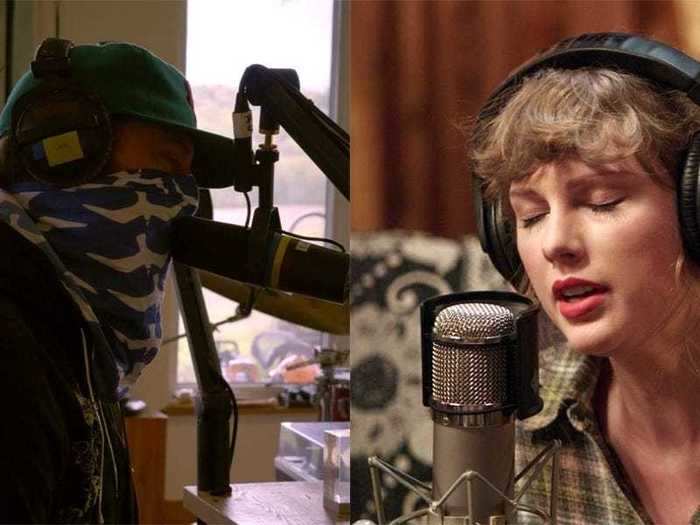
"Evermore" appears to describe Alwyn's stabilizing presence in Swift's life, even during times of uncertainty and turmoil.
The opening lines of the song ("Gray November / I've been down since July") point to current events, but they also hint at her current relationship timeline, similar to "Call It What You Want" ("I recall late November / Holding my breath, slowly, I said / 'You don't need to save me / But would you run away with me?'").
"There's sort of a double meaning to the months that are mentioned and the feelings that are mentioned," Swift told Lowe. "I wrote this song and these lyrics when we were coming up to the election, and I didn't know what was going to happen."
"But it also reflected back to an experience I had that was pretty life-altering, when I went through a bunch of bad stuff in 2016," she continued, which is the year she met Alwyn. "All those times were just, sort of taking it day by day to get through."
"I had a feeling so peculiar / That this pain would be for / Evermore," she sings in the chorus.
Swift previously used the phrase "for evermore" in "New Year's Day" ("Candle wax and Polaroids on the hardwood floor / You and me forevermore").
It could also be a nod to Emily Dickinson, who famously used the word "forevermore" to end her poem, "One Sister have I in our house."
In the second verse, Swift moves into December. "Can't remember / What I used to fight for," she sings, recalling her previous duet with Bon Iver, "Exile" ("You're not my homeland anymore / So what am I defending now?").
Unlike "Exile," however, Bon Iver's appearance shifts the song in a more positive direction. He seems to buoy Swift, promising "we'll be tall again," regardless of the season.
As Larocca noted, Bon Iver could be interpreted as a stand-in for Alwyn, who cowrote the song.
"And when I was shipwrecked / I thought of you," Swift sings in response to his verse, calling back to the ship imagery in the album's opening track, "Willow."
In the final chorus, Swift adjusts the lyrics to convey a lasting message of hope.
"And I was catching my breath / Floors of a cabin creaking under my step," she sings, evoking the cottagecore imagery of "Folklore," as well as the music videos for "Cardigan" and "Willow."
"In the last chorus, the person goes inside, and finally is warm, and finally is safe," Swift told Lowe. "It's about, sort of, the process of finding hope again."
- Read more:
- Taylor Swift's 'Evermore' isn't as good as 'Folklore,' but it's still better than what everyone else is doing
- Taylor Swift confirmed that Joe Alwyn cowrote 3 of her 'Evermore' songs. Here's a timeline of their famously private relationship.
- Every detail and Easter egg you may have missed on Taylor Swift's album 'Folklore'
- The 20 best albums of 2020, ranked
READ MORE ARTICLES ON
Popular Right Now
Popular Keywords
Advertisement